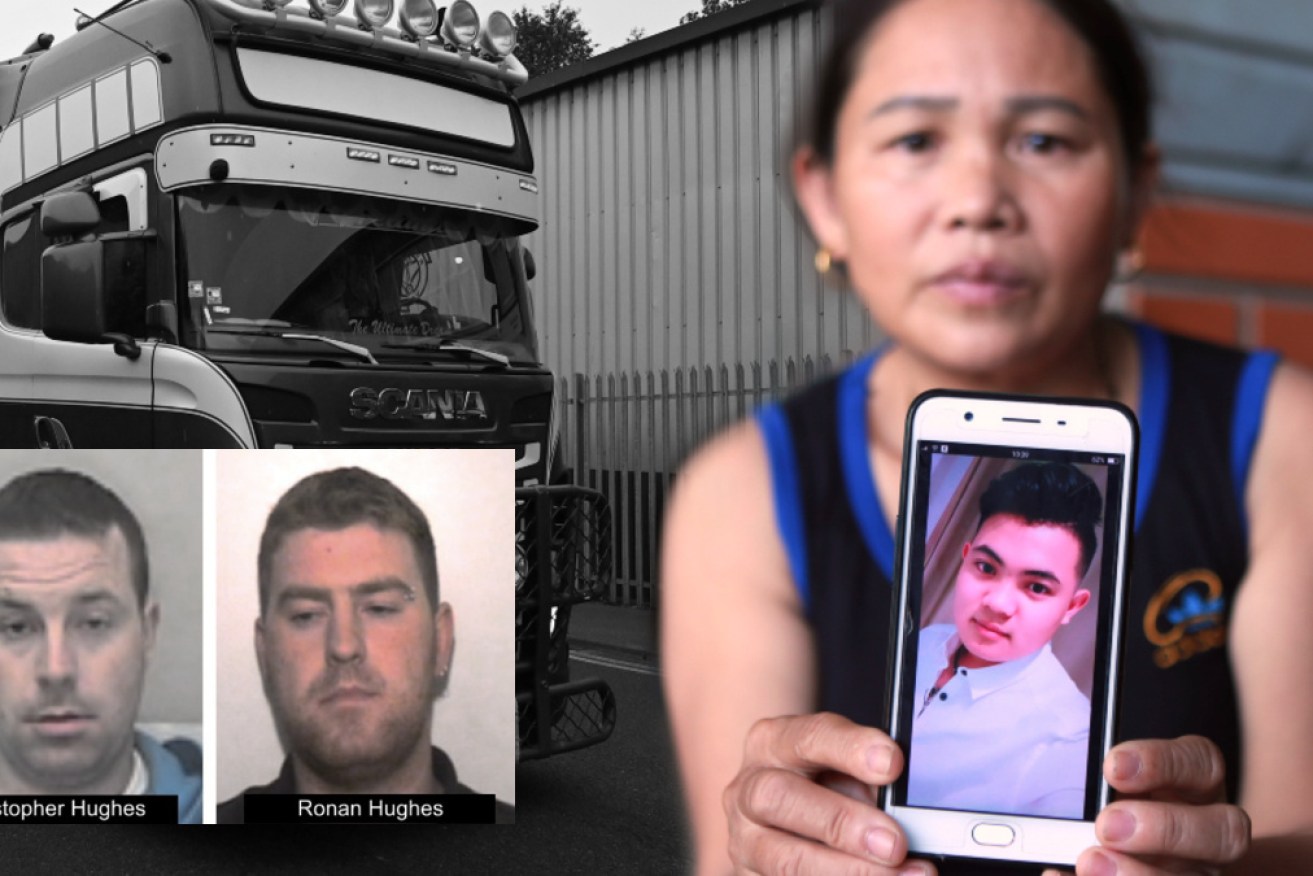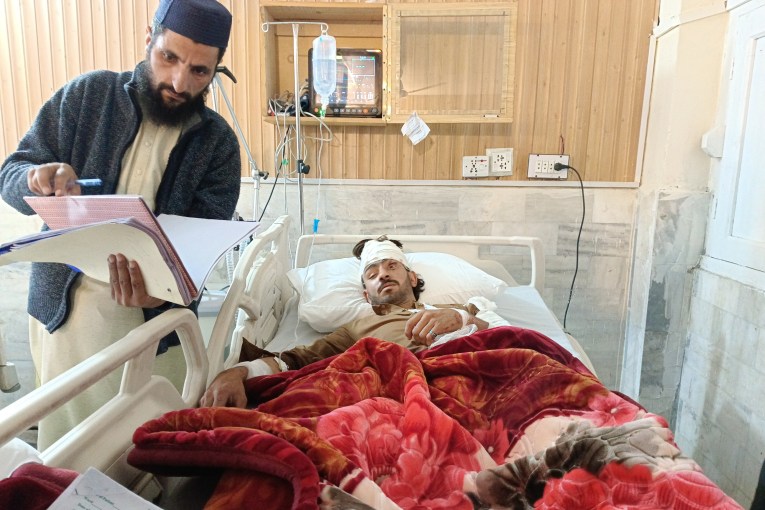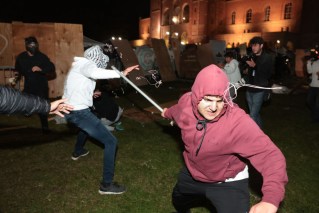Essex truck victims: Who and what made Vietnamese villagers leave home?


Hoang Thi Ai shows a photo of son Hoang Van Tiep, as police in the UK hunt suspects. Photo: AAP/ Essex Police
Revelations that most of the 39 people found dead in a refrigerated trucking container in the UK were Vietnamese has exposed “the tip of the iceberg” of human trafficking in the south-east Asian country.
Detectives now believe the dead were victims of a global people smuggling ring, as more information comes to light about the extent of the operation and the number of people potentially linked to case.
On Wednesday morning, Essex police released photographs of two more suspects.
Ronan Hughes, 40, and his brother Christopher, 34, from Armagh in Northern Ireland, are wanted on suspicion of manslaughter and human trafficking.
Detective Chief Superintendent Stuart Hooper, who is leading the investigation, said: “Finding and speaking to the Hughes brothers is crucial to our investigation.
“At this time we believe they are in Northern Ireland but they also have links to the Irish Republic.”
The 25-year-old Irish truck driver, Maurice ‘Mo’ Robinson’, has been charged with manslaughter, conspiracy to traffick people, conspiracy to assist unlawful immigration and money laundering.
As well as finding those responsible, police are still grappling with the task of identifying the victims. Vietnamese families desperate for answers about their loved ones could be forced to wait weeks for official word on the identity of the victims – most of whom had no official identification – through fingerprints, dental records and DNA, as well as photographs from friends and family.
The Vietnamese government said Britain had sent dossiers regarding four of the people found in the truck, seeking help in identifying them.

Nguyen Thi Phong and Pham Van Thin, parents of Pham Thi Tra My, at home in Can Loc district, Ha Tinh province. Photo: AAP
Australian man Michael Brosowski, founder of Blue Dragon Children’s Foundation, left his job as a school teacher to rescue Vietnamese victims of human trafficking and children living in poverty.
Speaking to The New Daily from Hanoi, Mr Brosowski said he was unsurprised most of the victims were Vietnamese given the human trafficking trade was “so horrible, so common in Vietnam”.
- Baby farms: A new kind of sex trafficking
- Forced marriages: The cruel practice forcing Vietnamese women into sex slavery
“This trafficking into the UK is getting global attention, but it’s the tip of the iceberg,” Mr Brosowski said.
He estimated about 80 per cent of Vietnamese people who were trafficked went to China and other destinations instead.
Those who went to the UK, he explained, usually came from the poor rice-growing provinces of Nghe An and Ha Tinh, and had probably been tricked by false promises of an easy journey and a better life.
“People are signing up for this saying ‘I want to go, take my money’, but they’re doing that because they’ve been deceived. They’ve been told it’s easy, that everyone does it, and that when you get there the streets are paved with gold,” Mr Brosowski said.
“These are people who really do live in poverty and might not have much experience of the world, and they believe that out in the west there’s so much wealth.”
How are they getting to the UK?
Mr Brosowski said most hopeful Vietnamese immigrants flew to eastern European countries like Russia, Bulgaria or the Czech Republic first.
“Historically, that’s where there are lots of Vietnamese people and perhaps where law enforcement is a bit lax,” he said.
“If you can get a visa to get to the Czech Republic, you can get to the UK. People might pass through nine different countries on their way.”
He said some Vietnamese travelled through China to get to the UK, but that it was uncommon.
What happens once they get there?
Rather than marvelling at “streets paved with gold”, life for many poor Vietnamese migrants often becomes harder once they arrive in the UK because many are forced into helping Vietnamese criminals.
“They’re being exploited by Vietnamese criminals in the UK who are running cannabis plantations or laundering money and they need people to help them so they go back to their villages and trick people,” Mr Brosowski said.
He said it was hard for British police to clamp down on these illegal activities because people smugglers would warn their victims that UK authorities, though friendly, could not be trusted.
What is it about Vietnam that makes locals want to leave?
Unlike war-torn countries such as Afghanistan, Syria or South Sudan, which produce huge numbers of refugees, the quality of life for people in Vietnam has improved dramatically over the past 30 years.
More than 45 million people in Vietnam – nearly half the country’s population – were lifted out of poverty between 2002 and 2018, according to figures by the World Bank.
Poverty rates dropped sharply from over 70 per cent to below 6 per cent, and GDP per capita increased by 2.5 times, standing over $US2500 ($3650) in 2018, figures show.
The country’s thriving economy has largely been due to bold free-market economic reforms (known as ‘doi moi’) introduced in 1986 that aimed to ease restrictions on businesses and remove price controls.
Today, nearly everyone uses electricity as their main source of lighting – up from 14 per cent in 1993 – and nearly three-quarters of the country’s rural population has access to clean water.
While millions of Vietnamese ride this wave of rapid economic development, plenty have fallen behind.
“You do have people in big cities and industrial areas with terrific opportunity, then you have lots of people in rural locations who are missing out on that and want to get ahead and improve their lives just as they see others improving theirs,” Mr Brosowski said.
As the gap between the rich and the poor increases, many look overseas for a taste of the same job opportunities, leaving them vulnerable to human trafficking.








